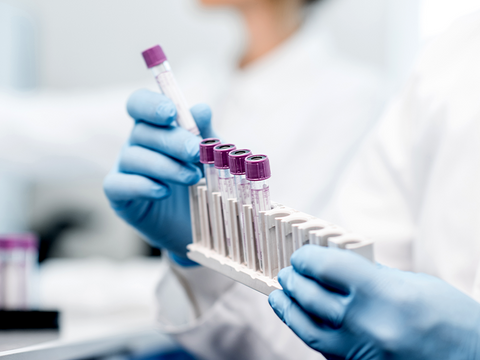Grab your cheat sheet... |
As men, it's crucial to understand how the hormones circulating throughout your body affect your fitness, health, and brain.
Testosterone is an essential hormone that can regulate many physiological processes within males, including muscle strength and sex drive, to name just a few influences.
Although most men know that abnormally high or low hormone levels can be problematic, many don't know what level is normal for them.
This blog will explore this question and break down the answers for each age category to get a bigger picture of what levels you should aim for in your body.
What is testosterone (and why is it crucial to have normal levels)?
Testosterone is an essential hormone in men that stimulates bodily growth and development while regulating our reproductive health.
As a result, it is relatively easy to spot signs of abnormally low testosterone levels. All you have to do is study the areas that testosterone influences and see if issues are cropping up.
For example, testosterone keeps your sexual urges healthy and energized, builds muscle, and helps regulate your moods. Therefore, low testosterone levels can cause issues like decreased libido, tiredness, decreased muscle mass, and an increased risk of depression and other brain issues.
It’s why balancing testosterone levels throughout life is so important for men and their health. If your testosterone has fallen too low, you can take counteractive treatments, implement lifestyle changes, and take supplements to restore your previous healthy levels.
It's worth consulting your doctor to ensure your hormones function optimally, as they can point you toward measures to improve your levels. Or, you can carry out a home test to check your testosterone levels.
Having the right amount of testosterone in the body ensures optimal mental and physical functioning, so ensure you have normal levels for sustained healthy living for your age.
Just be aware that the amount needed differs for everyone and every age group, so only compare yourself and those in your age category.
What are normal testosterone levels for a teenager?
As a teenager, reaching the peak of your physical health and growth is paramount. Knowing the normal testosterone levels for your age will help you ensure that your body is functioning at its best.
For boys, normal testosterone levels range from 270-1,070 ng/dL throughout puberty.
During this time, testosterone production increases and peaks by late adolescence or early adulthood to a point where it will be at its highest throughout your life.

It's essential to remember that there can be some variations between individuals during this period, so consult your GP if you have any concerns about your hormone levels.
If you've never checked your hormone levels before, post-puberty is a good time to do it, as it will help you figure out a normal level for you, which you should try and maintain for as long as possible.
Normal testosterone levels for men of different ages
Numerous age-based averages can guide you if you're a male wondering what's considered normal regarding testosterone levels.
Generally, the normal range for adult men is between 270 ng/dL and 1,070 ng/dL. As you can see, there's a major difference between the minimum and the maximum testosterone level, meaning that normal for you may mean something different to normal for someone else.
Men under the age of 20 typically have higher average levels. As you get older, however, your testosterone naturally decreases; men 60 years of age and older usually have the lowest testosterone levels. Here's a more in-depth look at what's good for each decade of your adult life.
20s
For men in their 20s, having normal testosterone levels is essential for physical and mental health. Staying within the healthy range of around 300 to 1000 nanograms per deciliter has many benefits, including improved energy, increased muscle mass, and better cognitive performance - all attributes a young man needs to start his adult life on the right foot.
Low or high testosterone can affect various areas, such as muscle composition, libido, and mood regulation.
Therefore, testing your testosterone levels should be the first step if you're a man in your 20s looking to ensure overall well-being and high-level functioning. Keeping it within 300 and 1000 nanograms sets a great benchmark for success.
30s
Male testosterone levels begin to decline in our 30s, but that doesn't mean we're out of the game just yet, as the drop-off is minimum.
Normal testosterone levels for men in their 30s range from 270-950 nanograms per deciliter (ng/dL); anything below this means it might be time to check to see if your levels are abnormally low.
To outperform this age group, getting up to 1050 ng/dL will ensure that your masculine appearance and fitness will stay with you for longer. When testosterone levels are healthy, they help increase muscle mass, sharpen mental focus, and give men their vigor and strength.

Your 30s should be a time to reach peak performance, not write off your physical activity. With the right balance of diet and exercise, any man in this age bracket can achieve normal levels just as easily as he did in his twenties.
40s
Men in their 40s should be aware of their testosterone levels, as this is the age when things can start to drop suddenly. Studies have indicated a normal range for testosterone in this age bracket is 250 to 900 nanograms per deciliters (ng/dL).
Keeping an eye on your testosterone levels and heeding the advice of medical professionals can help you remain healthy and vigorous throughout your mid-life years.
This natural drop in testosterone can contribute to issues like fatigue and lower muscle mass, so it's always good to try to get your testosterone levels above average.
You can do that by adopting a healthy lifestyle or using the natural supplements available at Testoprime.
50 and over
As you get over 50 years old, you really need to start thinking about your hormone levels, as this is where they can drop a lot. Normal levels for men over 50 range from 200-870 nanograms per deciliter (ng/dL).
These numbers may vary slightly depending on age and health history, as things such as smoking or drinking in your earlier life can result in much lower levels than this.
It is essential to check your testosterone levels periodically as you age. This is an excellent preventative measure to maintain overall health and vitality.
Testosterone deficiencies can lead to fatigue, depression, decreased muscle mass and bone density, irritability, and cognitive difficulties.
Taking proactive steps to monitor your testosterone levels will help set the groundwork for healthier aging so that you can maintain your fitness from when you were younger.
How to test your testosterone levels
Testing your testosterone levels is vital for understanding your overall health. Men should consider it as they age to help maintain an optimal hormone balance.
There are a few ways to go about it, but the most common is a blood test, which a doctor or a home test can do.
Your doctor will draw some blood, do a few calculations, and provide you with the results of your hormone count. You'll likely get total and free testosterone results, giving you a good idea of your T levels' effectiveness.

Unfortunately, more than a single test is needed to determine what action should be taken, if any.
That's why it is often recommended that men have their testosterone levels tested regularly over time to track changes accurately and develop an action plan if necessary. Testing may feel intimidating, but taking control of your health is worth the effort.
How can I improve my testosterone levels?
You can make a few key lifestyle adjustments to boost your testosterone levels. Firstly, get enough sleep - a chronic lack of sleep is linked to low testosterone levels in men.
Secondly, hit the gym - weightlifting and other resistance training not only make you stronger, but they also help raise testosterone levels directly.
Lastly, regulate your stress levels - too much stress has been shown to reduce testosterone which can lead to fatigue and depression. Making small changes can help a lot but try some of the following for a more effective route to boosting testosterone levels.
[h3]1. Eat a Healthy Diet
Eating a healthy diet is also crucial for increasing testosterone levels. Foods rich in vitamins and minerals, such as leafy green vegetables, oily fish, and nuts, can help boost testosterone production.
Additionally, avoid processed foods and excessive amounts of sugar, which can lead to low testosterone levels.
[h3]2. Reduce Stress Levels
Stress can harm testosterone production, so finding ways to reduce stress is essential.
Taking up a relaxation technique such as yoga or meditation can help lower stress levels and improve overall health. Additionally, try to avoid stressful situations as much as possible and take time out regularly.
[h3]3. Take a supplement
Taking testosterone supplements may benefit you if you want to see immediate improvements in your testosterone levels to obtain a normal or above-average level.
Testoprime is the leading manufacturer of natural and effective testosterone supplements, using our scientifically backed formula to help your body create more natural testosterone. It's a great alternative to testosterone boosters and can help you maintain normal levels to stay fit and healthy.
Find your normal
Testosterone is essential to men's well-being and quality of life, but several factors can lead to lower testosterone levels. Awareness of these symptoms and causes is essential to maintain good health. And it’s worth noting that every man will have a different normal, so it’s about finding what is standard for you.
Taking steps to ensure healthy testosterone levels for your age and fitness level includes paying attention to your body; eating a balanced diet; exercising regularly; and reducing stress.
While it may be difficult to identify low testosterone levels independently, testing and consulting with a doctor can help determine if you need additional treatment or lifestyle changes to keep your testosterone levels high.
With these precautions, men can take charge of their health and enhance their overall physical and mental well-being, regardless of age.





